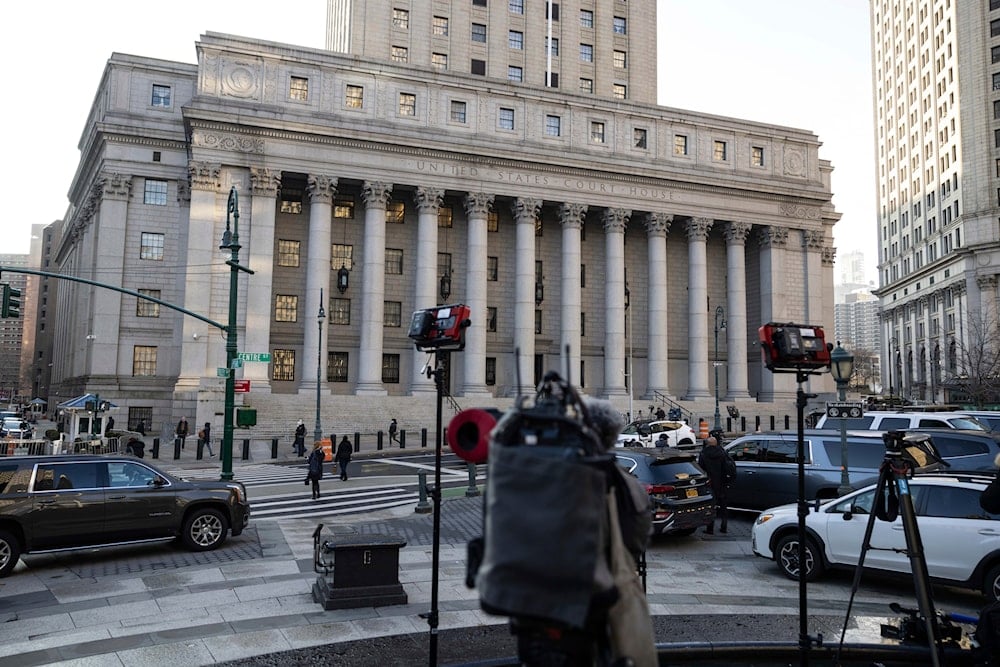DOJ, FBI say Epstein had no 'client list', died by suicide: Axios
Despite years of conspiracy theories, federal investigators say surveillance footage shows no foul play in Epstein’s death and no evidence of blackmail.
-

A general view shows the federal courthouse on December 28, 2021, in New York. (AP Photo/Yuki Iwamura)
A newly surfaced internal memo from the Department of Justice, obtained by Axios, revealed that the Trump administration's DOJ and FBI officially concluded that Jeffrey Epstein died by suicide and did not maintain a so-called "client list" or blackmail network involving powerful individuals.
The findings directly challenge years of speculation and conspiracy theories surrounding the financier’s death in 2019.
According to the memo, federal investigators found no evidence that Epstein was murdered or that anyone entered his cell area the night he died in New York’s Metropolitan Correctional Center. Surveillance footage, both raw and enhanced, shows no unauthorized access, aligning with the New York City medical examiner’s official determination of suicide by hanging.
Surveillance footage reveals no breach, says FBI
Investigators reviewed cellblock footage from 10:40 pm on August 9, 2019, to 6:30 am the next morning, when Epstein was discovered unresponsive. The FBI enhanced the video for clarity, adjusting contrast, sharpness, and color, and concluded that no individuals entered Epstein’s unit during that time.
The memo states: “Investigators found no incriminating ‘client list,’ no credible evidence that Epstein blackmailed prominent individuals, and no evidence that could predicate an investigation against uncharged third parties.”
DOJ closes door on future charges, frustrates GOP critics
According to Axios, the DOJ confirmed that no further charges will be filed against others associated with the Epstein case. Ghislaine Maxwell, Epstein’s longtime associate, is already serving a 20-year sentence for child sex trafficking.
Despite the finality of the memo’s findings, skepticism remains among some Republican lawmakers. In February, Rep. Anna Paulina Luna (R-Fla.) blasted the DOJ’s handling of the case, calling a previous document release “a complete disappointment,” and demanding full transparency on Epstein’s alleged network.
Notably, two former high-profile skeptics of the Epstein suicide narrative, Kash Patel and Dan Bongino, have since taken on senior roles in the FBI. Bongino, once a vocal critic of the DOJ’s handling of the case, publicly reversed his stance in May. “He killed himself,” he told Fox News. “I’ve seen the whole file.”
Their shift marks a rare break from far-right media narratives, many of which have long insisted Epstein’s death was a cover-up. Patel and Bongino, once regulars on conservative talk show questioning Epstein’s death, now appear aligned with the DOJ’s official conclusion.
Musk-accusation fallout and Trump’s distancing
The memo’s release follows a brief public spat between Elon Musk and Donald Trump. In June, Musk accused Trump of being named in the Epstein files. Trump fired back by posting a statement from Epstein’s former attorney, David Schoen, asserting the former president was not implicated in any crimes. Musk later walked back the claim, deleting the posts and admitting he “went too far.”
Though Trump told reporters in 2019 that he had not spoken to Epstein in 15 years and had banned him from his properties, records show the two were socially linked in the 1990s. In a 2017 interview, Epstein referred to Trump as "my closest friend."
The DOJ memo concludes that no further Epstein-related disclosures are anticipated. Citing the need to protect the privacy of victims and avoid implicating uninvolved parties, the department also stated it would not release any content deemed "child pornography," despite calls from the public and lawmakers for full transparency.

 4 Min Read
4 Min Read










